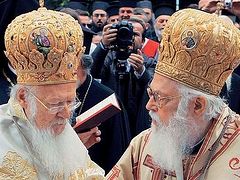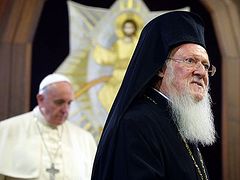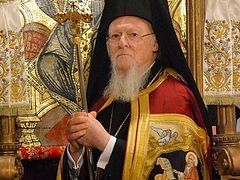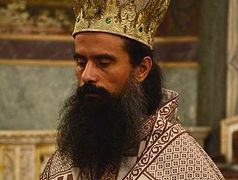Istanbul, March 22, 2019
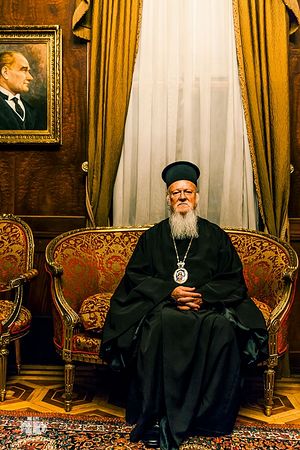 Photo: dimitrisvlaikos.com In late December, Patriarch Bartholomew wrote to the primates of all the Orthodox Churches, calling on them to recognize the creation of the so-called “Orthodox Church of Ukraine” and the election of “Metropolitan” Epiphany Dumenko as its primate. In January, the Holy Synod of the Albanian Church wrote to Pat. Bartholomew expressing its strong objections to receiving hierarchs and clergy whose ordinations trace to anathematized and self-consecrated “hierarchs.”
Photo: dimitrisvlaikos.com In late December, Patriarch Bartholomew wrote to the primates of all the Orthodox Churches, calling on them to recognize the creation of the so-called “Orthodox Church of Ukraine” and the election of “Metropolitan” Epiphany Dumenko as its primate. In January, the Holy Synod of the Albanian Church wrote to Pat. Bartholomew expressing its strong objections to receiving hierarchs and clergy whose ordinations trace to anathematized and self-consecrated “hierarchs.”
Pat. Bartholomew then responded to His Beatitude Archbishop Anastasios of Tirana and All Albania, invoking a number of historical examples to justify his Patriarchate’s supposed right to judge on appeals from any Local Church and to receive such clergy. The letter has been published in English by the Archons of the Patriarchate.
Unfortunately for Patriarch Bartholomew, the historical arguments he makes do not hold water and often make the opposite point of the one he is trying to make. Several important analyses have been published on the site Orthodox Synaxis.
According to Pat. Bartholomew, the fourth-century Meletian schism in Egypt is an important historical precedent that helps to justify the reception of Philaret Denisenko, Makary Maletich, and their thousands of schismatic clergy without re-ordination. “The problem,” Orthodox Synaxis writes in its article “The True Story of Patriarch Bartholomew’s ‘Meletian Schism,’” “is that the Patriarch’s characterization of the Meletian Schism and its outcome is utterly and completely inaccurate, to the point of being blatantly dishonest.”
Pat. Bartholomew writes that Bishop Meletios of Lycopolis in Egypt was defrocked around 302 for unlawful actions “including denying the faith and sacrificing to idols.” He persisted in schism, and when reconciliation was later achieved, he supposedly simply submitted a list of all of his bishops and clergy who were then received into the Church without re-ordination.
“So much of this is false,” writes Orthodox Synaxis, namely that the schismatic clergy were absolutely not received back into the Church without re-ordination, but specifically by being “confirmed by a more legitimate ordination,” according to the decision of the Holy Fathers of the First Ecumenical Council. Thus, the precedent of the Meletians, is, in fact, directly opposed to Pat. Bartholomew’s actions in Ukraine.
Moreover, Meletios was not defrocked for apostasy and idolatry, as Pat. Bartholomew claims, but for ordaining priests outside of his own jurisdiction, and he was not restored unilaterally by Patriarch Alexander of Alexandria, as Pat. Bartholomew maintains, but precisely by the First Ecumenical Council.
Recall that Pat. Bartholomew has continually refused to call a council to deal with the Ukrainian crisis, despite the fervent please of the Sister Churches.
Pat. Bartholomew also distorts the words of St. Athanasius the Great, and of St. Theodore the Studite (who specifically testifies that the Meletians had to condemn their schism in order to return to the Church—something the Ukrainian schismatics have never done) to make his case. For the full analysis, see the aforementioned Orthodox Synaxis article.
Orthodox Synaxis concludes:
It is almost unfathomable—yet it is true—that Patriarch Bartholomew chose to invoke the Meletian Schism in defense of his actions in Ukraine. The Meletian Schism indeed has striking similarities to the Ukrainian situation, but instead of supporting Constantinople’s actions, the sources cited by Patriarch Bartholomew—and those that he chose not to cite, namely the Letter of the First Ecumenical Council—serve as an indictment of the Ecumenical Patriarchate’s behavior.
What is especially striking is the audacity of Patriarch Bartholomew (or his ghostwriter) to bear such false witness in a letter to a fellow primate, Archbishop Anastasios. We can only pray that the Patriarch is moved by the exposure of this fraud to repent of his actions, and that the Church as a whole can take this opportunity to reflect upon the Meletian Schism and the many other episodes in church history that provide guidance to us in our present crisis. May God have mercy on us all.
The Patriarch’s letter contains an equally spurious argument in regards to the Council of Carthage and the extent of Papal authority, which Orthodox Synaxis has also penetratingly analyzed, concluding: “For reasons that remain unclear, Patriarch Bartholomew selected a quotation in support of his own decisions and authority from a letter and a Council that argue in precisely the opposite direction.”
Follow us on Facebook !

